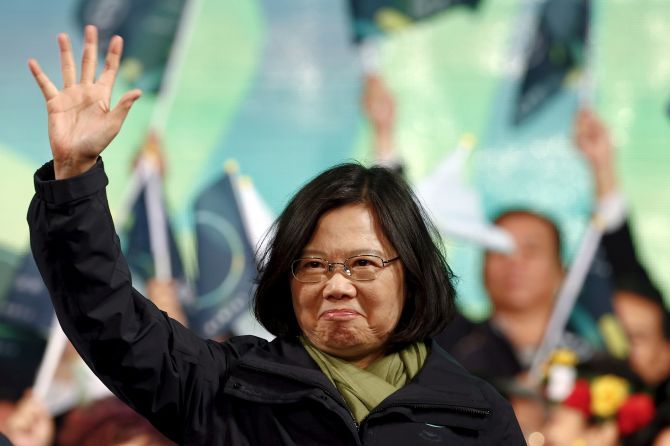How will China deal with Taiwan's first woman president?
Srikanth Kondapalli explains the significance of a historic election.

Much according to predictions, the Taiwanese people voted overwhelmingly for the pan-Green camp under the Democratic Progressive Party candidate Dr Tsai Ing-wen in the presidential elections on this island of over 23 million people and almost a third of the size of Arunachal Pradesh.
Dr Tsai, who lost to Dr Ma Ying-jeou in 2012 by less than a million votes, defeated Dr Chu Liluan by over three million votes. She won over 56 per cent of polled votes, which is the highest majority in Taiwan elections since 1996. This democratic upsurge has several long-term implications.
Firstly, the Taiwanese voters have, for the first time, elected a woman President, a record which most mature democracies like Japan, the United States may envy. Even in China, where gender equality was publicised as 'women hold half the sky,' no women candidate has ever made it to the top Politburo Standing Committee level for the past six decades. This is a special moment for the Taiwanese people -- who enjoy a high degree of gender equality.
Secondly, the Taiwanese have also demonstrated that their 'new democracy', which evolved in the 1990s, is vibrant and has an intense but orderly reflection of competitive politics. With the massive mandate, the more radical and iconoclastic New Power Party can jostle with the more conservative People's First Party over issues like stability across the straits and reunification concerns, livelihood, rights of the indigenous peoples and gender and trans-gender equality and environmental concerns.
Relations with China
While the China factor and cross-strait relations were one of the enduring debates in the elections, the people of Taiwan 'stood up' for their own destinies.
In 1995, China lobbed missiles across the Taiwan Straits to intimidate the electorate; the 2005 anti-secession law provided teeth to Beijing to use all powers at its disposal to silence Taipei and the number of China's military exercises increased during President Chen Shui-bian's rule between 2000 and 2008.
The recent meeting between then Taiwan president Ma Ying-jeou and Chinese President Xi Jinping in Singapore on the '1992 Consensus' and Xi's 'one family' idea, also did not cut much ice.
Relations with China have always troubled the Taiwanese people throughout their history since Zheng Chenggong and his son Zheng Jing's rule in the 17thcentury. Dr Tsai will also be under tremendous pressure in the coming years on this issue, although the people seem to be on her side.
China under pressure?
The democratic upsurge in Taiwan may also discomfort China, whose peripheries one by one have begun experimenting with democracy. As the people of Mongolia, Tibet, Taiwan, Hong Kong and Macau enthusiastically plunged into the democratic experiment, old political establishments are facing mounting ideological challenges to their political legitimacy.
Anti-incumbency also at work
The massive mandate, both in the presidential and legislature elections, to the DPP indicates the growing resentment against the policies of the ruling Kuomintang. The revision of textbooks to inculcate 'One China' sentiments, a declining economy (with a growth rate of about one per cent last year), rising unemployment and cost of living (despite an election promise of '6-3-3' -- 6 per cent growth rate, $30,000 per capita income and under 3 per cent unemployment) and 23 trade deals and closer economic integration with China have alienated many young Taiwanese voters from the KMT.
KMT leaders Lien Chen and Ma Ying-jeou met with the Chinese top brass recently. Zhang Zhijun, head of Beijing's Taiwan Affairs Office, became the first minister from China to visit Taiwan in June 2014. These meetings resulted in some dissonance in Taiwan's political spectrum.
Of course, the KMT is not down and out. As the Grand Old Party of Taiwan, it controls crucial economic, political and military levers where the DPP had only made a peripheral entry during its tenure between 2000 and 2008. The clash between the two main political entities promises to be intense, if not nasty.
Relations with India
While the mainstream political parties in the last two decades have exhibited some interest towards India in 'Go South' policy, President-elect Dr Tsai Ing-wen has prioritised India and Southeast Asian countries as her focal areas in expanding economic ties, given the recent rises in growth prospects in these countries.
She had visited New Delhi earlier and has a first-hand knowledge of the affairs. India and Taiwan have been discussing free trade area proposals for sometime and attempting to harmonise items of trade.
Taiwanese major IT firm Foxconn has already expressed an interest in the Indian market. If India reciprocates with the same vigour, there will be mutual benefits.
Unlike his predecessors, Prime Minister Narendra Modi, for the first time during his visit to Japan in 2014, gave a clarion call for support to democracies abroad. New Delhi was previously satisfied with democracy taking roots in South Asia.
Apart from increasing its contributions to the United Nations Democracy Fund and actively engaging the Indian Diaspora abroad, the new Indian postures have not yet acquired concrete departures.
The massive mandate in Taiwan adds a new dimension and a new challenge of readjustments to the Indian diplomatic postures in the Indo-Pacific region in the coming years.
Srikanth Kondapalli is Professor of Chinese Studies at the Jawaharlal Nehru University.










